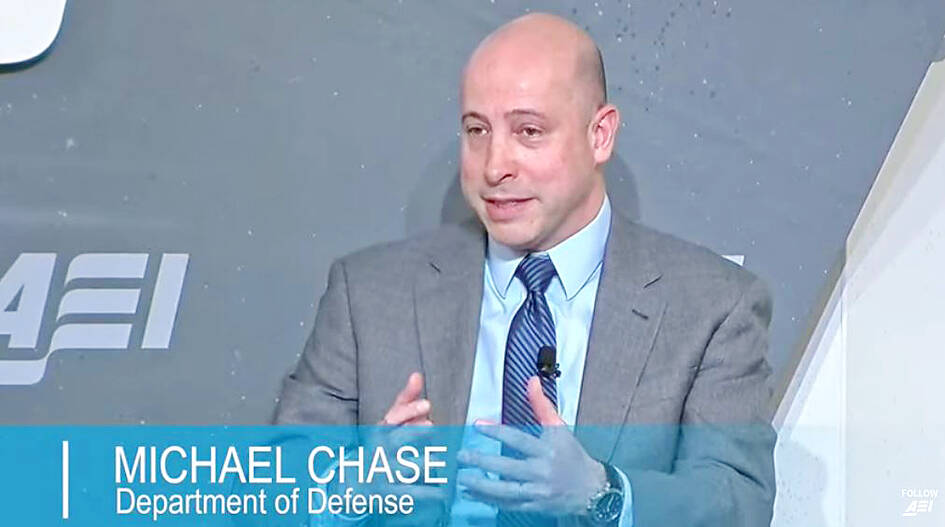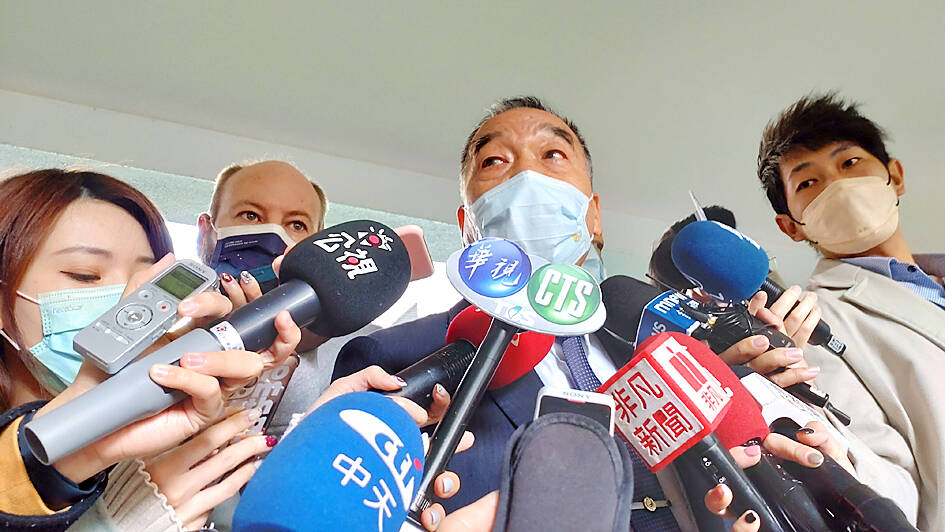The top US defense official on China arrived in Taiwan yesterday, the Financial Times reported, although Minister of National Defense Chiu Kuo-cheng (邱國正) said he was “not very certain” about the plan just hours before the arrival of US Deputy Assistant Secretary of Defense for China Michael Chase.
The newspaper confirmed the arrival, citing one of four sources who earlier said Chase would visit Taiwan this week.
Asked on the sidelines of a legislative session in the morning about Chase’s plan, Chiu said that “those who are friendly to us” are welcome to visit Taiwan.

Photo: screen grab from an American Enterprise Institute livestream
“But so far it is not very certain,” he told reporters. “I won’t explain the details... I won’t explain until I get formal notification.”
The Financial Times said the Pentagon declined to comment on the visit, but cited it as saying that the US’ “support for, and defense relationship with, Taiwan remains aligned against the current threat posed by the People’s Republic of China.”
“Our commitment to Taiwan is rock-solid and contributes to the maintenance of peace and stability across the Taiwan Strait and within the region,” Pentagon spokesman Lieutenant Colonel Martin Meiners told the newspaper.

Photo: Yang Cheng-yu, Taipei Times
Chase is the most senior US defense official to visit Taiwan since 2019, when then-US deputy assistant secretary of defense for East Asia Heino Klinck visited.
In November 2020, US Navy Rear Admiral Michael Studeman, who at the time was in charge of intelligence at the US Indo-Pacific Command, made an unannounced visit to Taiwan, and the Financial Times reported that Studeman made another visit last year as Chinese and Russian bombers flew a mission over the Sea of Japan.
Separately, a top Chinese Nationalist Party (KMT) official on Thursday said that US House of Representatives Speaker Kevin McCarthy would “definitely” visit Taiwan this year, even though the speaker has yet to announce the plan.
KMT Department of International Affairs director Alexander Huang (黃介正) made the remarks in an interview after concluding a visit to the US on Saturday.
Talks with McCarthy’s aides and aides to other Republicans on Capitol Hill suggest that the speaker is planning to visit Taiwan this year, Huang said.
Even aides to Democratic US representatives did not rule out a visit by McCarthy, he said.
Huang said McCarthy, who was sworn in last month, is still new to his position, which potentially affects his travel schedule.
US media last month reported that the Pentagon is preparing a security detail for a Taiwan visit by the speaker in the spring.
Referring to a visit by McCarthy’s predecessor, Nancy Pelosi, in August last year, Huang said the Democratic Progressive Party (DPP) seemed “underprepared” for her visit.
There were four months between Pelosi’s initial comments that she would like to visit Taiwan and her arrival, Huang said.
The DPP had enough time to plan the visit with US agencies and predict China’s reaction, he added.
Huang said that the DPP frequently claims that Taiwan-US ties are at their “all-time best,” but it has yet to prove it by showing the public that it can clearly communicate with US agencies before McCarthy’s planned visit.

CHAOS: Iranians took to the streets playing celebratory music after reports of Khamenei’s death on Saturday, while mourners also gathered in Tehran yesterday Iranian Supreme Leader Ayatollah Ali Khamenei was killed in a major attack on Iran launched by Israel and the US, throwing the future of the Islamic republic into doubt and raising the risk of regional instability. Iranian state television and the state-run IRNA news agency announced the 86-year-old’s death early yesterday. US President Donald Trump said it gave Iranians their “greatest chance” to “take back” their country. The announcements came after a joint US and Israeli aerial bombardment that targeted Iranian military and governmental sites. Trump said the “heavy and pinpoint bombing” would continue through the week or as long

TRUST: The KMT said it respected the US’ timing and considerations, and hoped it would continue to honor its commitments to helping Taiwan bolster its defenses and deterrence US President Donald Trump is delaying a multibillion-dollar arms sale to Taiwan to ensure his visit to Beijing is successful, a New York Times report said. The weapons sales package has stalled in the US Department of State, the report said, citing US officials it did not identify. The White House has told agencies not to push forward ahead of Trump’s meeting with Chinese President Xi Jinping (習近平), it said. The two last month held a phone call to discuss trade and geopolitical flashpoints ahead of the summit. Xi raised the Taiwan issue and urged the US to handle arms sales to

BIG SPENDERS: Foreign investors bought the most Taiwan equities since 2005, signaling confidence that an AI boom would continue to benefit chipmakers Taiwan Semiconductor Manufacturing Co’s (TSMC, 台積電) market capitalization swelled to US$2 trillion for the first time following a 4.25 percent rally in its American depositary receipts (ADR) overnight, putting the world’s biggest contract chipmaker sixth on the list of the world’s biggest companies by market capitalization, just behind Amazon.com Inc. The site CompaniesMarketcap.com ranked TSMC ahead of Saudi Aramco and Meta Platforms Inc. The Taiwanese company’s ADRs on Tuesday surged to US$385.75 on the New York Stock Exchange, as strong demand for artificial intelligence (AI) applications led to chip supply constraints and boost revenue growth to record-breaking levels. Each TSMC ADR represents

Pro-democracy media tycoon Jimmy Lai’s (黎智英) fraud conviction and prison sentence were yesterday overturned by a Hong Kong court, in a surprise legal decision that comes soon after Lai was jailed for 20 years on a separate national security charge. Judges Jeremy Poon (潘兆初), Anthea Pang (彭寶琴) and Derek Pang (彭偉昌) said in the judgement that they allowed the appeal from Lai, and another defendant in the case, to proceed, as a lower court judge had “erred.” “The Court of Appeal gave them leave to appeal against their conviction, allowed their appeals, quashed the convictions and set aside the sentences,” the judges